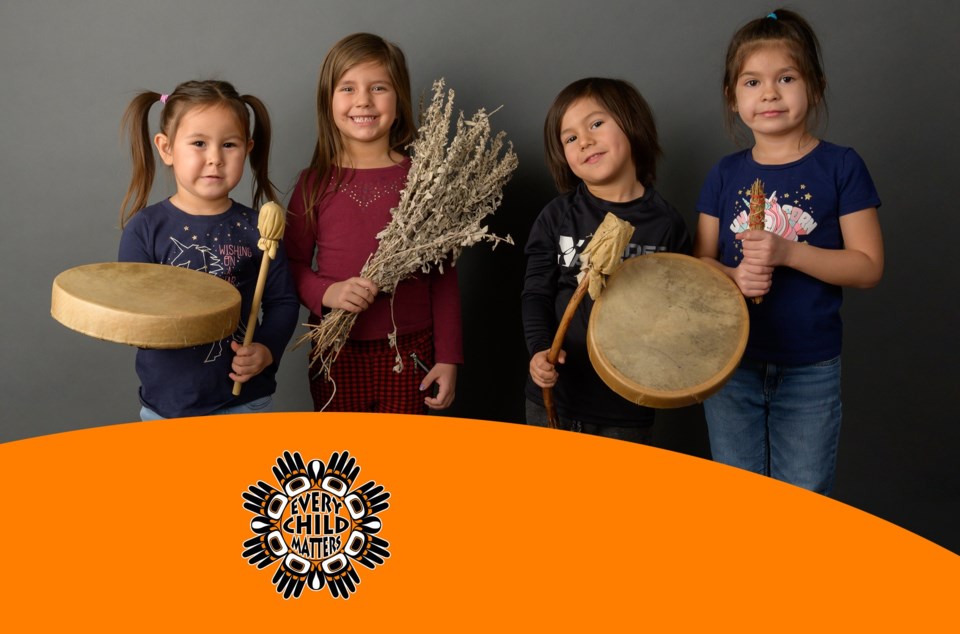Nipissing First Nation honoured the survivors and victims of Canada’s former residential school system, Wednesday, a week after the community lost its fourth young adult this summer to drug overdose.
The usual public gatherings for the nationally-recognized Orange Shirt Day were not held due to the COVID-19 pandemic but the spirit of the annual Sept. 30 event was given life through social media.
Nipissing Chief Scott McLeod Shabogesic posted a video message on his Facebook page that described how Indigenous children sent to residential schools were “disconnected from their culture and traditions” and forced to adopt Christianity and speak only English or French.
More than 150,000 Indigenous children were put through the church-run and government-sanctioned assimilation schools between the 1860s and 1990s. Thousands died of disease, neglect, and abuse while many survivors returned with broken spirits and became dysfunctional in their home community without their language and culture. The destructive effects, compounded by systemic racism outside reserves, rippled through generations.
Canada officially apologized for the “wrong, cruel and absolute failure” of the system in 2008, McLeod Shabogesic said, urging everyone to fight racism and learn “Canada’s true history.”
He also shared a video by the Orange Shirt Day originator, Phyllis Webstad, from Dog Creek First Nation, near Williams Lake, B.C., who explains what is behind the slogan ‘Every Child Matters’ and how everyone has a child within.
“When I talk to survivors,” George Couchie told BayToday via telephone, “it’s almost like they are children again reliving the trauma they went through, it takes them right back to that time.”
He described how his father returned from residential school “a defeated” person who became an alcoholic. A retired Ontario Provincial Police sergeant, Couchie has been providing non-Indigenous people a clearer understanding of the inter-generational impacts of residential schools since 1996. He also organizes camps for Indigenous youth to help them reconnect to their culture and find that “inner spark’ to provide light for their life journey.
Couchie, of Redtail Hawk Training and Consulting, was returning from Lady of Sorrows Catholic Elementary School in Sturgeon Falls where many Nipissing children from Garden Village attend. He said the school and many others recognize the need to battle racism and bullying with exposure to Indigenous culture and perspectives. The school’s website features Indigenous students prominently in positive ways. Couchie was given permission to have photographs taken for campaign posters promoting racism awareness and cultural understanding among health-care workers and police. Among those supporting the campaign, he said, are Dr. Mike Leckie, of the North Bay Regional Health Centrer, who recently connected with his own Indigenous roots, and North Bay Police Chief Scott Tod.
“It’s sad we have to do this in the year 2020,” Couchie said, “but we want to change how people perceive others.”
Making headlines this week out of Quebec was a video of a Cree woman being verbally abused by health care workers in her dying hours. Last month, a video circulated on social media of an RCMP officer punching a window forcefully and threatening to smash open a door during a so-called health check on an Indigenous person.
Chief McLeod Shabogesic told BayToday the community is coming together to address the roots of the substance abuse that leads to the overdose deaths.
One of the keys, he said, is reducing the stigma associated with being addicted to drugs so the person feels they can reach out for help. Another priority is reaching young people before they get caught up in substance abuse. A community-wide campaign is expected to roll out in October and November that coincides with mental health and addiction awareness efforts.
“What can we do now before they even start?” he said about the goal of having everyone work together for a common purpose.
 Nipissing First Nation Chief Scott McLeod Shagogesic's Facebook profile photo on Orange Shirt Day Sept. 30, 2020.
Nipissing First Nation Chief Scott McLeod Shagogesic's Facebook profile photo on Orange Shirt Day Sept. 30, 2020.
